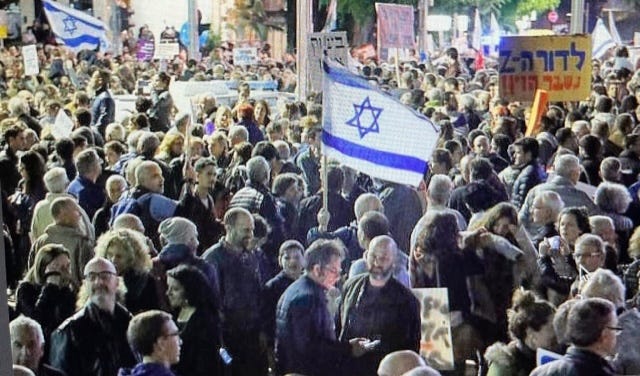Key Coalition Figure To NY Rabbis: We’re Not Interested.
Clergy grapples with how to support a state they love and a government they fear.
Who will blink first? Protests against the government have increased over the last three months but coalition members remain focused on overhauling the High Court before Passover.
A delegation of New York rabbis visiting Israel last week ran into a hard dose of reality, experiencing the Netanyahu coalition leaders’ disdain for American Jewish views on the raging political crisis.
During a webinar conversation Monday evening, eight of the rabbis reflected on their mission, sponsored by UJA-Federation of New York. A telling moment was recalled by Rabbi Josh Davidson, spiritual leader of Congregation Emanu-El.
The denominationally diverse group was meeting with Simcha Rothman, a leader of the Religious Zionist Party and a key architect of the judicial reform legislation that threatens to divide the country irreparably.
“He referred to all of us as ‘Reformim,’” Rabbi Davidson noted. “We were all there to share our thoughts” in addition to hearing Rothman’s views. “But he didn’t give a hoot about what we thought. He spoke of democracy in majoritarian terms,” with little concern for minority rights.
The rabbi said Rothman told the group that if Reform Jews want more rights, they should move to Israel.
“What galled me” was that winner-take-all view of democracy, Rabbi Davidson told me the next day. He also said he was “deeply distressed” by what he characterizes as the “complicit” response among members of Prime Minister Netanyahu’s Likud Party to the breakneck rush toward a judicial overhaul.
“We who love Israel have a real battle on our hands with our own people,” said Rabbi Davidson, who leads the largest Reform congregation in the world. He said a major part of his rabbinic role is “trying to connect congregants to the Jewish people and the Jewish state,” and the current crisis “makes it much harder. It risks weakening our commitment to Israel and one another.”
Rabbi Davidson’s concerns were expressed by the others during the webinar as well.
Elliot Cosgrove of Park Avenue Synagogue said that one comment made during the group’s meetings with politicians, journalists and thought leaders, stuck with him. “Israelis used to say ‘save us from Iran’ and now they’re saying ‘save us from becoming Iran,’” he recalled.
Until now, the most serious threats to Israel have been external, but today those threats are internal, Rabbi Cosgrove noted, adding that he was deeply concerned at the high-speed attempt to change the judicial system, widely attributed to “ulterior motives” of those in the coalition who want weaken the High Court so they can enact a series of laws bolstering religious causes.
Amichai Lau-Lavie, an Israeli spiritual leader of Lab/Shul NYC, noted that Israelis are known for saying, even in hard times, “yehiyeh b’seder,” it will be OK. “But Israel has been flying on the seat of its pants, and it won’t be ‘b’seder’ on its own. We need to help create a healing moment.”
He cited a comment by Yedidia Stern, president of JPPI, a prominent Jerusalem-based think tank, who noted that “the one word that toppled [Israeli President Isaac] Herzog’s efforts [to foster compromise in his recent address to the nation] was his use of the word shivyon, Hebrew for equality, as a core value.”
The clear implication was that shivyon is taboo to coalition members focused on having their way, not on promoting parity.
The urgent need to find creative ways to foster authentic dialogue and debate within Israeli society – and between diaspora and Israeli Jews – was a common theme among the rabbis. Several expressed the hope, if not the belief, that coming this close to the full fracturing of Israeli society will convince leaders on both sides of the issue to step back and engage with each other.
The rabbis said they came away from the intense experience with a better understanding of why critics and defenders of the coalition are so passionate about their beliefs. Rabbi Meyer Laniado of Cong. Kehilath Jeshurun said that Sephardic Jews “feel unheard and under-represented” in a society where they are now the majority of the population but a minority in positions of leadership.
On the other hand, many liberal secular Jews have their own strong resentments, targeting charedim on two fronts: paying taxes that help support large charedi families who eschew the workforce, and having children who risk their lives in the IDF to protect a charedi community whose sons are exempt from military service.
Rabbanit Bracha Jaffe of The Bayit/Hebrew Institute of Riverdale cited an observation from Rabbi Benny Lau, a Jerusalem-based Modern Orthodox leader, that public flag waving used to be associated with religious nationalists, “but now secular Israelis are coming to the protests with flags. They want Israel back.”
She also stressed the importance of empathizing with the hurt feelings people expressed, whether or not one agrees with them.
Rabbi Ari Lorge of Central Synagogue said an Israeli colleague reminded him that there will be “a day after” the crisis for Israelis in their relationship with the diaspora. “We have to prepare for that day,” the rabbi said.
The sobering experience reinforced Rabbi Tully Harcsztark’s commitment “to build relationships directly, and to teach our kids” — he is the dean of SAR, a Modern Orthdox high school — “to help create a society where people can live together.”
As a campus rabbi, Jonah Geffen of Hunter College Hillel worries that many students know little about the complexities of the intense drama taking place in Israel. “Our responsibility to educate and inspire them” is particularly challenging, he said, at a time when the society is edging toward the brink of anarchy.
But Rabbi Geffen said a comment made by Rabbi Abraham Joshua Heschel resonates with him: “I am an optimist, against my better judgment.”




